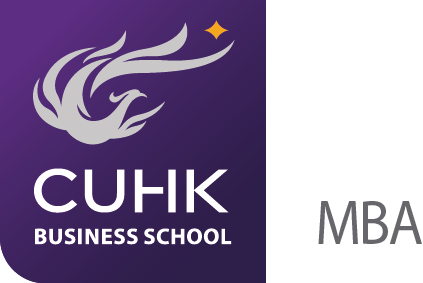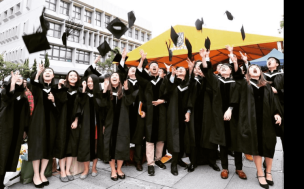Stephanie Villemagne, associate dean at Hong Kong's CUHK Business School, tells us why
In an interview with BusinessBecause this year, the CEO of the Graduate Management Admission Council (GMAC), Sangeet Chowfla, remarked on the global state of the MBA.“The demise of the MBA is exaggerated,” he told us. “It’s not dead, it’s just relocated to Asia.”
This certainly seems to be true—the latest GMAC Application Trends Survey Report shows a 10.5% drop in foreign applications to the USA, while schools in the Asia-Pacific region reported overall growth.
In the case of Hong Kong, it’s easy to see why this might be.
This month saw the opening of the brand-new West Kowloon station, which will function as the terminus of the Hong Kong section of the Guangzhou – Shenzhen – Hong Kong Express Rail Link, connecting the city to mainland China in under 25 minutes.
This is not all. Next month, the ‘gateway to China’ will also be getting a 34-mile highway connecting it to Macau and Zuhai, establishing itself as the world’s longest sea bridge.
The name of the game in all of these advancements is hyper-connectivity: creating a super-connected high-tech area to rival the USA’s Silicon Valley. With tech hubs cities like Guangzhou and Shenzhen in the loop, it makes sense that tech-focused MBAs are shifting their focus to Hong Kong.

For Stephanie Villemagne, associate dean of graduate programs at the , these changes have prompted a shift in the employment landscape across China and Hong Kong—one that CUHK grads are particularly well-placed to go into.
“We [have connections] in traditional industries—finance, accounting, the hardcore consultancies—and this is still something that graduates go into, but we’ve [also] seen a shift towards technology,” Stephanie says.
“Big tech companies and smaller ones, boutique consultancies in tech and fintech—there’s a really big boost for young graduates to start in finance via the startups that are disrupting the big banks.”
Evidently, entrepreneurial instinct in the tech space is an increasingly valuable asset for MBA grads, whether they're looking to go into a small startup or a big corporate. Not only do students in Hong Kong benefit from the new super-fast transport links to China and Shenzhen, but for those at there is also access to incubators, both in Hong Kong city and Shenzhen itself.
For MBAs from outside of Asia, the school offers the opportunity to learn more about conducting business in China while also having an awareness of what’s going on outside of it.
“What I think is great is that they get this understanding of Chinese culture, but also an understanding of what it is like outside and bringing that into China—which is really what the next stage of China is,” Stephanie says.
“We prepare [students] with soft skills, communication styles—how do you approach a Chinese employer? How do you use the alumni network? It’s really about utilizing this network to your best interest.”
In this age of rapid technological advancement and hyper-connected, high-tech business hubs, it is this instillation of business savvy and soft-skill proficiency that Stephanie believes will keep the MBA relevant well into the 21st century.
“It’s about adaptivity,” she explains. “The MBA to me is a generalist degree—yes, we should still teach the hardcore skills because they’re the baseline, but we should also teach what’s happening in the world today and tomorrow.
“Are we still going to have investment bankers? Will they look like what they look like today? I don’t believe so, because fintech is disrupting the tools investment bankers are using.”
For Stephanie, the way forward for MBA directors is not to focus on the million minute changes in technology and teaching students about these—it’s not what’s changing that MBAs need to learn, but how, and how they can deal with this in a business context.
“What we’re trying to do here on the MBA and why the MBA still has a few good years [left] is to teach graduates to think and adapt to this new environment,” Stephanie explains. “It’s not about learning to code—you can do that on your own time—it’s about how to talk to coders, to bring innovation into your company.”
The challenges of teaching adaptivity to MBA students is dealing with the uncertainty inherent to a tech landscape defined by constant innovation.
Volatility is part and parcel of this kind of change, so teaching students to make decisions under pressure, identify disruptors and incumbents, and get to know oneself as a leader is paramount.
“What is bringing to graduates is that we’re keeping them in relatively small-sized programs to make sure that they get the necessary hard skills—the basics—but also the soft skills: the ones that will get them to think about the future,” says Stephanie.
“It’s very much [about] integrating into [our] family: you’ll grow with us and we’ll grow with you—we’ll accompany you from the moment you come here to the end of your career.”
Student Reviews
One of a kind
I studied Bioinformatics at CUHK last year. It was the only Master's degree in Hong Kong in this field. This program developed my analytical skills and equipped me to be a Bioinformatician in a very practical way.
I enjoyed my year here and met classmates from different parts of the world. If you are thinking to enhance your profile, this degree program would be a good option.
general education courses, unique college system, large campus
The university facilitates multi-dimension and interdisciplinary learning. In social science faculty, we need to choose courses as our faculty package from other departments (architecture, psychology, sociology, etc.) to learn more than our major required courses. We are also required to finish general education courses, which aid our critical thinking and humanistic sensibilities. I do recommend the social science broad-based program, and the professors I met so far are all responsible and erudite.
LLM
The faculty of law is relatively new. You do not need to have a LLB to pursue a LLM, which is special. The taught programme is great for mature students who want to obtain legal knowledge.
CUHK has good teaching staff too.
Amazing Campus and Great Educational Environment
Not only is CUHK's main campus breathtaking, it provides for a good educational environment for students. The university is well-equipped with modern and up-to-date facilities to help students with their study. We have 8 libraries in total around the campus; one for media, one for architectural studies, the medical library and the law library. The Professors are always helpful and are happy to talk to students when needed.
Moreover, the college system within the university brings forth the uniqueness of CUHK. Each student belongs to a different college, and in that students are able to meet different peoples from different countries and students from different faculties.
I think CUHK provides for a well-rounded university life for all students.
exthrillating
One of the most down to earth places in HK. A great opportunity to learn and embody the local culture. Also had one the most beautiful campus in Hong Kong up on the hillside. Glad to have graduated here.
Innovative and Supportive
My university provided me with all the support I needed, and encouraged me to be up to date with all the new developments in the world. They also provided me with the incentive to excel at what I do, and they take much pride in my achievements. I have had a very rewarding university experience.
Small, New But Friendly Law School
To being with, I think the campus of CUHK is the best and the biggest in Hong Kong, with fresh air and trees everywhere.
I am an undergraduate Law student at CUHK and I think the teaching here is great, with very friendly and nice professors and the new Lee Shau Kee Building.
In terms of the courses offered by CUHK, as one of the largest universities in Hong Kong, CUHK is an all-rounded university, offering a wide range of courses to students. Students may take the introductory courses of discipline other than their own major, or even declare a minor.
For law electives, due to the small amount of intake, the variety of law electives are not that huge. However, the Faculty is offering some international programmes, which can be treated as law electives, but at the same time, provide us with an opportunity to travel and know more about the legal system of another country.
The career support from the Faculty of Law is also amazing. The Faculty will organise CV Sessions and talks on how to get an internship from law firms or mini-pupillage from barrister's chambers. Each student will also have a Distinguished Professional Mentor, which is a current legal profession, providing us with practical advices and updates of the legal field.
Finally, from my personal experience, I think the students in CUHK are friendly and genuine. As Law students, competition is inevitable for grades, GPAs, vacation schemes and training contract. However, I think the competition in CUHK Law School is a positive one, in a sense that help us grow together, instead of fighting with each other no matter what. That is the biggest reason why I am having a very good time here in CUHK Law School.
A place to explore your interests
As a law graduate from CUHK (both undergrad and post-grad), I realise that I had many opportunities to explore my areas of interests (legal and non-legal both). The faculty/university requires us to take a certain number of non-law electives, and offers a plethora of courses to choose from. Personally, I took 3 modules in Korean --I can't say it's made me highly proficient, but it's definitely given me a good foundation (I can walk into a Korean restaurant and confidently order food, at the very least). The fact that language courses are offered also provides students who are more financially constrained an opportunity to learn a language without having to shell out a premium for a decent language course. On top of that, we have a range of law electives as well. I know of classmates who have developed lasting interest in different areas of law because of the electives they took in school. The two electives that I would say have changed me is (i) mooting and (ii) family law. I think my experience in an international commercial arbitration moot competition has helped tremendously in formulating legal arguments and legal writing. On the other hand, taking a family law elective has made me very interested in the family law practice, especially in terms of child rights. For these experiences which I have gained, I'm grateful for the opportunities provided by the school.
One main issue most students I know have is with the way our GPA is calculated and the lack of transparency in terms of how the honours system works. As our GPA is marked on a curve. it's highly unrepresentative of what we have achieved as individuals. Given that our GPA is the only criteria that is looked at when we apply for the compulsory post-graduate law course (mandatory should we want to practise law and/or be trainees in Hong Kong), it will put our own students at a distinct disadvantage when we compete for limited spaces with students from schools where GPA is not on a bell curve.
Valuable time in CUHK
I like the learning environment and people at CUHK. Surrounded by hills and Tolo Harbour, CUHK provides a balance between nature and hustle. You can always escape from the busy study life and meet your friend around the big campus for different activities.
The largest and great university in HK
CUHK is one of the top universities in Hong Kong and is ranked in the QS World University Rankings 2025. It consists of eight colleges, creating a diverse university experience with a wide variety of activities.
The campus is the largest in Hong Kong, featuring its own MTR station and six regular shuttle buses (1A, 1B, 2, 3, 4, 8) along with three "meet-class" school buses to provide efficient transportation between classes.









